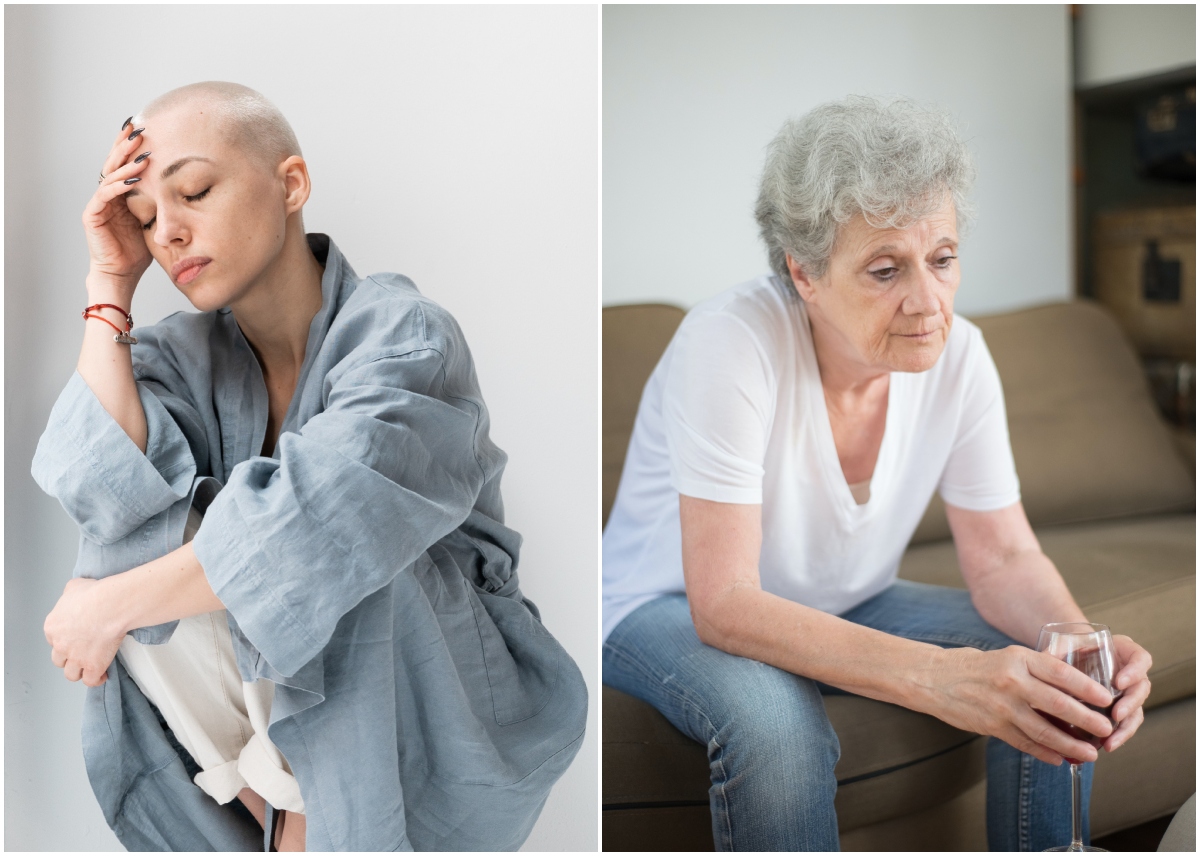
I know my period is coming when I get one to three days of intense abdominal pain and a bitching headache that only really gets better by sleeping my way out of it. Oh, and I also get weepy and generally despondent about all my life choices. Despite going through this ritual once a month for 23 years now — yes I know the exact date I got my first period and no, it’s not weird and/or pathetic to mark it on your calendar as an anniversary — it feels like it sneaks up on me each and every time. The headache will be so bad I can’t think and I’ll go way down the rabbit hole of negative thoughts before it clicks in my head, “oh, I’m getting my period.” Call me stupid, but I thought PMS was a guaranteed part of the cycle. A new study out of Sweden, though, released results that say people who experience premenstrual disorders are twice as likely to have early menopause as those who don’t (thus implying not all of us are plagued gifted with PMDs). So basically we get the worst of both worlds. Some more on these uplifting findings:
Twice as likely: “We found compared to women without PMDs, those with PMDs have 2.67 times the risk of having early menopause,” said lead study author Yihui Yang, a doctoral student at Karolinska Institutet in Sweden, in an email. Menopause is considered early when it occurs before age 45, which will happen in 5% to 10% of women, Yang said.
The risks of early menopause: “It is important to identify women at risk for early menopause because of its link with poorer heart, brain and bone health,” said Dr. Stephanie Faubion, director of the Mayo Clinic Center for Women’s Health and medical director of The Menopause Society. Faubion was not involved in the research. A 2010 study found that women who experience early menopause are at an increased risk for overall mortality, including cardiovascular diseases, osteoporosis and neurological diseases.
Hot flashes are more likely to be worse, too: Women with PMDs were also more likely to have severe vasomotor symptoms — or hot flashes and night sweats, according to the study. Prior research has shown a link between hot flashes and later cognitive decline and heart attacks.
Some details on the research: The study, published Tuesday in JAMA Network Open, included data from more than 3,000 women — 1,220 with premenstrual disorders (PMD) and 2,415 without — who took part in the Nurse’s Health Study II, which investigates the risk factors for chronic diseases in women. Beginning in 1991, the women self-reported their PMD diagnoses and answered a questionnaire to confirm symptoms, the study said. Researchers followed participants every two years until 2017 to assess when the women went through menopause and in three of those surveys asked about the severity of their symptoms.
PMDs are a correlation, not a cause: It is important to note, since this is an observational study, that it cannot say that having premenstrual disorders causes early menopause. Instead, the results show that there is a correlation between the two, said senior study author Dr. Donghao Lu, an associate professor in the department of medical epidemiology and biostatistics at Karolinska Institutet. The study is well designed, however, and “highlights an important reproductive health-related condition that is under-recognized and under-treated,” Faubion said. Next, researchers need to discover why the two conditions are linked and whether there is a biological process that connects them, Faubion said in an email.
Formal definitions of PMS and PMDD: Premenstrual syndrome is a condition involving monthly physical and mood changes leading up to menstruation, according to the American College of Obstetricians and Gynecologists. Symptoms can include anxiety, depression, irritability, insomnia, poor concentration, appetite changes, fatigue, aches and pains, headache, bloating, gastrointestinal symptoms, and abdominal pain. A small percentage of people have premenstrual dysphoric disorder, or PMDD, which is similar to PMS but includes more severe symptoms like panic attacks, anger that may impact other relationships and lack of interest in regular activities, according to the Office on Women’s Health, which is part of the US Department of Health and Human Services. While you can’t get rid of PMS or PMDD, medications and behavior changes can help to manage symptoms, Faubion said.
There are menopause practitioners: Women also need to know that there are ways to manage early menopause and the bothersome hot flashes, she said. Faubion recommends talking with your provider or finding a menopause expert or Menopause Society Certified Practitioner (MSCP), whom you can find through menopause.org. There may not be much that people with PMDs can do now, but it is important to know a potential risk for the future, Yang said. “They may consult health professionals for potential prevention and/or intervention when the time comes,” she said.
As my mother likes to say, the design of the human body leaves a lot to be desired. I could bemoan at length the injustice of this system that leaves most of us miserable in mind and body once a month, and then rewards that misery with doubled odds for early, riskier menopause. But I happen to not have my period now so I’m making myself curb the impulse to rant. Instead I’m going to laugh at the overall tone of, “here’s this new info, you can’t really do anything about it now, good luck!” (Hey, it beats crying about it.)
One point I want to nitpick is I wish they would have incorporated perimenopause into the conversation. Like, is there a difference between early menopause and perimenopause? Is there an early perimenopause? What are the differences among all these stages? I have to ask because it is not talked about enough! Although we have great voices working to change that. I also felt the info about the Menopause Society Certified Practitioners was the most useful, because it’s an actionable bit of help. I’d never heard of them before (of course), and am grateful to know the resource is available. Something to cling to until the Karolinska Institutet has amassed another thirty years’ worth of research to report on.
photos credit: Shvets Production, Kampus Production, Andrea Piacquadio and Liza Summer via Pexels













I don’t know anybody who menstruates without PMS. Plus I think our understanding of menopause, perimenopause etc. is bound to change a lot in the years to come.
Same. I have PMS *and* my mom didn’t hit menopause until her 60s, so I have years ahead of me. Lo loestrin has removed my cramps, though, since I no longer get a period – though I still retain water and get really moody.
I rarely ever had PMS, and went into menopause in my late 20’s. Also, this study was in Sweden, not exactly a correlate population to the US demographic, I’d be hesitant putting a huge amount of weight on it.
There are some of us. My period was like clockwork, pain-free, and lasted 3 days, but I’d get very mildly nauseated the day before so I knew it was coming. Went into menopause at 47 and have had zero menopause symptoms at all (now 52). My naturopath says I’m just lucky. I have other medical problems, but this isn’t one of them.
I never had PMS until perimenopause, but now I do. Hugs to everyone who had to deal with this the whole time, it’s awful! (It’s not that my periods were trouble free, it’s just that the trouble started after each period began, I just had no PRE menstrual problems)
My PMS was awful, often bedridden, and every single month I wanted to stab people for about 3 days prior. Went into meno at 51 which is average? But sadly since then, all those years ago, all that’s changed apart from 15kg weight gain is that I want to stab people 24/7 365 🤷
I had horrible pms and finished menopause at 48 and you know what else is a symptom of menopause, you won’t have pms or horrific painful periods anymore!!! I don’t give a rats a** about the hot flashes or brain fog because they are much much less unpleasant than all of the monthly awfulness of pain, mood swings, bleeding like a stuck pig, passing clots the size of peach stone. Why do these researchers always make menopause sound like something terrible when NOT HAVING A PERIOD ANYMORE is so freeing and awesome
@Chaine, Thank you for your comment!
I’ve been in early perimenopause, and have been since I was 41 (about five years) and my doc and friends act like it is a horrible thing, but I’ve had debilitating PMS since high school, with cramps so bad I would often pass out from the pain, and then since childbirth with migraines that would knock me out.
I’m delighted to be coming to the end of that BS! We need to stop framing menopause as the end of the world!
Well, my mother is the one going through menopause but she has told me it is way better than having a period. I have a feeling she is right. The media and certain doctors should stop with the scare tactics regarding menopause. Periods suck. Some of us can’t wait to get rid of them.
I think it is perimenopause up to and including your very last period. Then it’s menopause. So early menopause would be an early very last period. In my 40s after kids, the periods started getting closer together. Then they started pacing further out. By the time they stop, I will be grateful.
Not getting periods is the absolute BEST thing about getting older! It’s right up there with realizing that you don’t actually have to put up with BS.
Back in the ’80s and ’90s, PMS was largely treated like a joke or “all in your head.” Perimenopause for me was like PMS on steriods and was a significant factor in the breakdown of my then marriage, back in the teens. A big part of it for me was that it was impossible to get good solid sleep. So I’m happy to see this stuff being taken seriously by the med establishment. Women’s issues just weren’t taken seriously for such a long time.
I honestly hope everyone else has an easier go of it. The light at the end of the tunnel is no more periods! And way fewer Fs to give!
I’m in perimenopause now and it’s awful. There’s almost no information out there on what to do, and most doctors just shrug their shoulders when you bring it up.
Womens’ health issues are understudied and ignored. I’m sorry you are going though this. I was in perimenopause for about 10 years. For me, the worst was the periods that would last 10 days. Finally, I had a D&C that pretty much ended my cycles. There is light at the end of the tunnel. It does end and no more periods ever. That part is amazing!
@FHMOM thank you for the words of encouragement.
I’m in peri too and I feel your pain. I’ve really liked Jen Gunther’s menopause manifesto. Lots of good info, it’s really helped me understand what to expect.
Menses are the most confusing awful fucked up thing we have to endure once a month. It’s never the same twice, and I suffer from PMDD, a particularly severe form of PMS, that makes me contemplate suicide when it hits the hardest. Cheers to womanhood!
Great study about how PMS impacts women. Running the risk of sounding like a biggot but I am going to do it anyway, please keep women’s health issues as women’s not people, we have gone through too much to be annulled or ammassed with “people” having gender specific, vaginal centric issues now.
Nope. Hormonal issues are experienced by everyone, but the effects differ due to biology. This means that trans men go through it. How exactly does it harm you to acknowledge this fact?
It doesn’t “annul” you to accept that hormones are a big deal and will mess people’s health up. You’re not special. (But ofc you are special. But not because you have “vaginal centric issues.”) It’s not even “vaginal centric” but rather hormonal. Other people including trans folks go through all of this. So kindly stop judging. PEOPLE who get periods have to deal with this shite. Including you, me, and many trans men.
Honestly, what difference does it make to you? They have an even harder row to hoe than you or me. So please, don’t discriminate. Just ignore it. If you’re not trying to date them, what difference does their biology make to *you*? You’re probably ok being called “guy” which actually negates women and girls. That’s the same thing, but the other direction, hmm?
And, yes, that was a bigoted and unnecessary statement. Please attempt to have some compassion and do better. Or at the very least, keep it to yourself. The world does not need more discrimination.
Upvote a bunch…. this is why we need a like button
It’s Peri until you go a full year without a period, at which point you are in menopause. I’m hoping the symptoms end there and then because Peri symptoms are awful. And I had PMS since my first period at 13. I’m 50 now so it didn’t come earlier but regardless, it’s not fun.
I heard that most of the awful symptoms of peri do get better once you’re in full on menopause. Let’s hope anyways.
Apparently there is also a link between endometriosis and early menopause, and it wouldn’t surprise me if that’s the common thread–terrible PMS and endometriosis often go together. (I have both and at 48 am praying that menopause hits soon–it’s clearly on the horizon!)
I never would have suspected this. My Mom and her sisters had such awful pms, possibly could have been diagnosed as pmdd but had late menopause. I get really bad pms but we will see about menopause. Now I won’t just figure it’ll be late like them. We also have a history of getting our periods early on my Mom’s side. I had only just turned 11 when mine came. So I wonder if that has an impact on when you go through menopause as well.
I had PMD (debilitating cramps, depression, bloating, etc.) and had menopause around 42. Additionally, I have had absolutely brutal hot flashes, insomnia, and mood swings with menopause. I am still taking HRT at 59 as whenever I attempt to wean off the symptoms come back. Fun times.
I would sometimes (not always) get horrible cramps with my periods when I was in my teens and early to mid twenties. I basically just had to sleep them off. That went away, though. I did get mood swings and maybe mild cramping after that, but the worst of it was over by my late 20s. I went through menopause and stopped getting my period in my early 50s (I’m 57), which is pretty average I think?
I do wish there were more awareness around pre-menopause, though. That was a weird experience and totally unexpected! For about nine months I was getting my period twice a month, which was fun. Then it went back to normal for about five years before they stopped altogether. What was that all about? It felt like my body was trying to send me a message, like: “Come on! You can do it! One more baby before this uterus shuts down for good!”
Wow I’m just now learning that every woman doesn’t get PMS. I really thought we all went through this. I guess some women are lucky. Also, perimenopause is f*cking hell. Enjoy your 20’s ladies…for real.